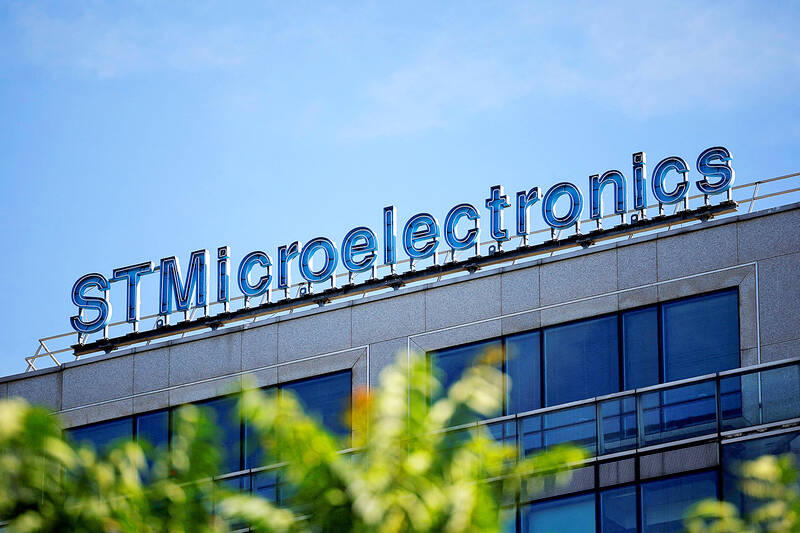Sales this year would fall to a range between US$13.2 billion and US$13.7 billion, Franco-Italian semiconductor company STMicroelectronics NV said in a statement yesterday. That is down from a previous range of US$14 billion to US$15 billion.
Chipmakers’ results in the quarter have been mixed. SK Hynix Inc reported its best quarterly profits in six years yesterday thanks to explosive global demand for artificial intelligence (AI). Texas Instruments Inc on Tuesday said that Chinese electronics makers were ramping up orders again after working through stockpiles of unused components, while Dutch chipmaker NXP Semiconductors NV on Monday reported a drop in revenue because of lower automotive chip orders and gave a disappointing forecast.
“During the quarter, contrary to our prior expectations, customer orders for industrial did not improve and automotive demand declined,” STMicro chief executive officer Jean-Marc Chery said in the statement.

Photo: REUTERS
Automotive revenues were lower than expected and offset higher sales in the company’s personal electronics business, he said.
STMicro — whose chips are used by electric vehicle and smartphone makers, including Tesla Inc and Apple Inc — said overall sales fell 25 percent in the second quarter from a year earlier to US$3.23 billion. That compares to analysts’ average US$3.2 billion forecast, according to estimates compiled by Bloomberg.
“Despite the small beat in the reported quarter, the company did not see the expected recovery in industrial orders and automotive orders declined,” JPMorgan Chase & Co analyst Sandeep Deshpande said. “The key question is, given the company’s very significant sequential cuts, will the market believe that the worst is over?”
Unlike automotive chipmakers who are facing low demand due to disappointing growth in the electric vehicle market, memorychip makers have been benefiting from a race to supply components essential to creating ChatGPT-like generative AI services.
SK Hynix posted an operating profit of 5.47 trillion won (US$3.96 billion) in April to June, its third consecutive quarterly profit after losses last year. Net profit jumped 115 percent year-on-year to 4.12 trillion won and revenues surged 125 percent to 16.42 trillion won — a record quarterly high.
The world’s second-largest memorychip maker dominates the market for high-bandwidth memory (HBM) semiconductors and is a key supplier for Nvidia Corp, which controls about 80 percent of the global AI chip market.
“The continuous rise in overall prices of DRAM and NAND products with strong demand for AI memories including HBM led to 32 percent increase in revenues compared to the previous quarter,” SK Hynix said.
Revenues for HBM chips rose more than 80 percent from the previous quarter and 250 percent year-on-year, it said.
“The company will further solidify the position as a leader in AI memory products by focusing on developing the best process technology and high-performance products based on a stable financial structure,” SK Hynix chief financial officer Kim Woo-hyun said.
Additional reporting by AFP

Taiwan’s foreign exchange reserves hit a record high at the end of last month, surpassing the US$600 billion mark for the first time, the central bank said yesterday. Last month, the country’s foreign exchange reserves rose US$5.51 billion from a month earlier to reach US$602.94 billion due to an increase in returns from the central bank’s portfolio management, the movement of other foreign currencies in the portfolio against the US dollar and the bank’s efforts to smooth the volatility of the New Taiwan dollar. Department of Foreign Exchange Director-General Eugene Tsai (蔡炯民)said a rate cut cycle launched by the US Federal Reserve

Handset camera lens maker Largan Precision Co (大立光) on Sunday reported a 6.71 percent year-on-year decline in revenue for the third quarter, despite revenue last month hitting the highest level in 11 months. Third-quarter revenue was NT$17.68 billion (US$581.2 million), compared with NT$18.95 billion a year earlier, the company said in a statement. The figure was in line with Yuanta Securities Investment Consulting Co’s (元大投顧) forecast of NT$17.9 billion, but missed the market consensus estimate of NT$18.97 billion. The third-quarter revenue was a 51.44 percent increase from NT$11.67 billion in the second quarter, as the quarter is usually the peak

The US government on Wednesday sanctioned more than two dozen companies in China, Turkey and the United Arab Emirates, including offshoots of a US chip firm, accusing the businesses of providing illicit support to Iran’s military or proxies. The US Department of Commerce included two subsidiaries of US-based chip distributor Arrow Electronics Inc (艾睿電子) on its so-called entity list published on the federal register for facilitating purchases by Iran’s proxies of US tech. Arrow spokesman John Hourigan said that the subsidiaries have been operating in full compliance with US export control regulations and his company is discussing with the US Bureau of

Pegatron Corp (和碩), a key assembler of Apple Inc’s iPhones, on Thursday reported a 12.3 percent year-on-year decline in revenue for last quarter to NT$257.86 billion (US$8.44 billion), but it expects revenue to improve in the second half on traditional holiday demand. The fourth quarter is usually the peak season for its communications products, a company official said on condition of anonymity. As Apple released its new iPhone 17 series early last month, sales in the communications segment rose sequentially last month, the official said. Shipments to Apple have been stable and in line with earlier expectations, they said. Pegatron shipped 2.4 million notebook